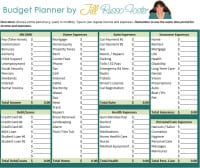 Now what about retirement? Are you on track? It’s never too early to start to save for retirement as you have the power of time. On the other hand, it’s never too late to start either. Sign up for your company’s retirement plan. You don’t want to pass up free matching funds. If that is not available, open your own retirement account and automate your contributions. Start today. #JillRussoFoster #FinancialLiteracyMonth
Now what about retirement? Are you on track? It’s never too early to start to save for retirement as you have the power of time. On the other hand, it’s never too late to start either. Sign up for your company’s retirement plan. You don’t want to pass up free matching funds. If that is not available, open your own retirement account and automate your contributions. Start today. #JillRussoFoster #FinancialLiteracyMonth
Financial Literacy Month #6
 Do you have an emergency fund? You never know what could happen in life. Experts say you should have 6 months to a year worth of income on hand for life’s what ifs. Yes, that can be overwhelming to go from minimal savings to this goal. Start by finding ways to save $5 a day to start. Automate your savings goals so that they happen. #JillRussoFoster #FinancialLiteracyMonth
Do you have an emergency fund? You never know what could happen in life. Experts say you should have 6 months to a year worth of income on hand for life’s what ifs. Yes, that can be overwhelming to go from minimal savings to this goal. Start by finding ways to save $5 a day to start. Automate your savings goals so that they happen. #JillRussoFoster #FinancialLiteracyMonth
Are you curious about when to start social security?

That’s a question on a lot of people’s minds. Should I take it early at 62 or at my full retirement age or wait until I am 70.
Well wouldn’t it be great if you had a crystal ball to get the right answer for you. Well, we don’t and you want to make the right decision for your situation.
Here is an article from the Motley Fool that could give you some information that may help you make a decision that’s right for you.
It’s Never Too Late
Welcome to 2022!
It’s time to think about your finances. What are your financial goals for the upcoming year? Are you looking to save for an emergency fund, retirement, a new home or home improvements, education, an emergency fund?
There is so much to accomplish and never enough money. Well, that is how I used to think. But not anymore. 
I started by taking small steps to achieve my financial goals. My first goal was to create an emergency fund of $5,000. Sounds overwhelming, but I broke it down into small steps:
$5,000 in one year is $416.66 a month – $5,000 in one year is $96.15 a week – $5,000 in one year is $13.70 a day
Next, I needed to find this money in my budget. What could I cut back on or do without? It turns out it was multiple ideas to come up with this money. We spaced out haircuts, we stopped buying beverages for work (we bring our own), we trim our dog’s nails ourselves and more.
Lastly, we automated the savings. Each paycheck we save $100.00 into our emergency savings automatically. It’s set and done.
Now we have the emergency fund we need to be prepared for whatever happens in our life.
Please know that it’s never too late to start to save for your goal. Obviously, the earlier you start the better off you are. But not starting is a mistake. Make a plan and decide to start now. You too can achieve your financial goals this year.
Our 2021 Finances
2021 with the pandemic had us take a look at our finances in relationship to our goals. As we near, retirement, we have put a plan together. 
This year we refinanced our mortgage. We had a 1-year ARM based on Treasury bill index, so it was time to get a low-rate fixed rate mortgage. We didn’t want to refinance for 30 years, so we chose a 15-year fixed mortgage that we plan to payoff in 10 years.
We had several credit cards that we didn’t use often and always paid in full when we used them. We made the decision to close these credit cards. Yes, it will lower our available credit line, but that isn’t a concern for us at this point.
We have maxed out our contributions to our retirement accounts and health savings account.
All in all, we have accomplished out financial goals for 2021. How about you?
Are You Losing Money?
Many companies offer their employees free matching funds for their retirement. According to CNBC, 17.5 million Americans leave this free retirement money on the table. Is this you? 
401K retirement account contributions are pre-tax, therefore lowering your taxable income. CNBC says that 17% of employees don’t contribute. Why not? Many people say they don’t have the funds to contribute to their retirement. Among those that do contribute, 12% don’t get the full matching funds.
When I worked at Norwalk Community College, one of the first things I did was read the entire employee manual. Yes, it was long, but it had valuable information that I could take advantage of. I chose the alternate retirement plan. For me that meant, I would have to contribute 5% of my gross income to receive the matching funds. As soon as I was eligible, I enrolled. In this particular plan, I was given 8% matching funds. Why wouldn’t I do this? For me, this was a no brainer. I have always accepted free money.
If you have accepted your free money, congratulate yourself. If not, enroll today (or as soon as you are eligible). You don’t want to pass up free money.
Planning Your Holiday Season
Getting your finances ready for the upcoming holiday season. With two months left to the year and all the news reports to shop now, what can you do?
First let’s start with your list. Who are you planning on making purchases for? 
Next, let’s take a look at your budget. How much do you have saved? How much can you afford to spend? Remember that the season typically includes more than gifts. You may have opportunities to attend gatherings, participate in events, and more. Don’t forget to include this in your budget too.
How is it looking? Are you all set and ready to shop? Or do you need to tweak your plan?
Some of the things we have done to reduce our spending is to cut back on gift giving, give one family gift as opposed to individual gifts and have get togethers instead of gifts. Take your list and think outside the box for what is right for you.
This is not the time to open a new credit card account, because you can get a discount. This is will lower your credit score with a new inquiry and new credit line. Probably not in your best interest. Plus, you don’t want to start off 2022 with holiday debt added to your budget.
Make a plan and decide what is right for you and enjoy the holidays.
Which Budgeting App Is Right For You?
 Ever wonder what budgeting app is best for you and your family? Not sure where to start? I am asked this all the time and I don’t have a recommendation for you. I still use a manual method and am happy with that for us.
Ever wonder what budgeting app is best for you and your family? Not sure where to start? I am asked this all the time and I don’t have a recommendation for you. I still use a manual method and am happy with that for us.
For those of you that do want to use an app, how do you make the right choice? Here is a great article from The Hartford comparing several apps to help you make the right choice.
Let me know what one you use and why. I would love to hear from you.
Finances In The Future
Last time we spoke about couples merging finances together. I have witnessed many couples who keep their finances separate. While I am not opposed to this, it can create problems down the road. 
I have a friend currently who is trying to piece together her deceased spouses finances. It’s unfortunate, he passed away unexpected and suddenly. Their finances were totally separate. Now she is having to search for where his bank accounts are, where his life insurance is and so much more. Yes, they were fortunate to have the legal paperwork in place – will, estate plan etc. but there are issues with the legal paperwork too. It more complicated for the surviving spouse as they are not only mourning their loss, they have to deal with the financial fallout.
When my mother passed away, my father was lost because he didn’t handle the finances. My mom was a bookkeeper and she handled all the bank accounts and bill paying. He never paid a bill in his life up to this point. He actually made piles on the dining room table of bills. Then the calls started to come in that the bills were past due. He assumed that things were automatic but they weren’t. The story of a spouse in the dark.
Make sure the surviving partner / spouse is aware of your financial situation and has access to the accounts. They should know how to access the bank / investment accounts. They should know where your life insurance policy is. They should know how to access your passwords. Take the time to have this discussion before it’s too late and have a plan in place.
Married Finances: Should Two Become One?
 Weddings are an emotional celebration. We love the idea of a bride and groom starting a new life together. We use words like “two becoming one” or “sharing your lives as one,” meaning that everything will be shared as though the couple are no longer individuals. I believe this puts a lot of unnecessary sentimental pressure on a couple to share all their finances even though it’s not always necessary, or even wise, to do so for every single account or property.
Weddings are an emotional celebration. We love the idea of a bride and groom starting a new life together. We use words like “two becoming one” or “sharing your lives as one,” meaning that everything will be shared as though the couple are no longer individuals. I believe this puts a lot of unnecessary sentimental pressure on a couple to share all their finances even though it’s not always necessary, or even wise, to do so for every single account or property.
So, how do you merge two separate financial lives? There are many successful ways to do this. Some couples keep their individual incomes and expenses separate by having separate bank accounts, credit cards etc. Then, they have a joint expense account for their household bills that they each put money into. Sharing the joint account can be as simple as having each person responsible for different bills, or figuring out the bill totals and having each put in their half. Some people base the joint account total on a salary percentage (this works great when one spouse earns more money that the other). And, of course, some people merge everything and all accounts are joint.
You need to think about what type of financial people you are. Here are 3 questions to think about that will help you decide (and could possibly save some financial squabbles):
- Are you a saver and your spouse a spender? Having one person be the fall back for financial emergencies can be challenging financially and to the marriage.
- Are you both spenders? What will happen when there are no reserves for emergencies?
- How do you each handle bill payment? Are all your bills paid on time? Do you have bills that have slipped through the cracks?
Answers to these questions can be tricky, but worth the discomfort. Proactive thought can be a financial life saver for your future. Double check your answers by looking at your account statements and credit reports. You may not be as good at finances as you think you are, or you might be better than you thought. Discuss your habits with each other, as well as any outstanding issues that could affect you both.
I am a firm believer that you both should participle in your finances. You have joint goals in your future, so you should do the financial planning for this together as well. Don’t let the responsibility fall to one person. If something were to happen to the “responsible” one, then the other party would be left completely in the dark, not knowing anything about the accounts or how to deal with them. I have seen many situations like this. It may seem kind, or convenient, to handle the money if your partner doesn’t know how, but it’s not.
Whichever way you choose to handle your finances as a married couple, make sure it’s a mutual decision based on real knowledge of your habits and goals.
- 1
- 2
- 3
- …
- 12
- Next Page »